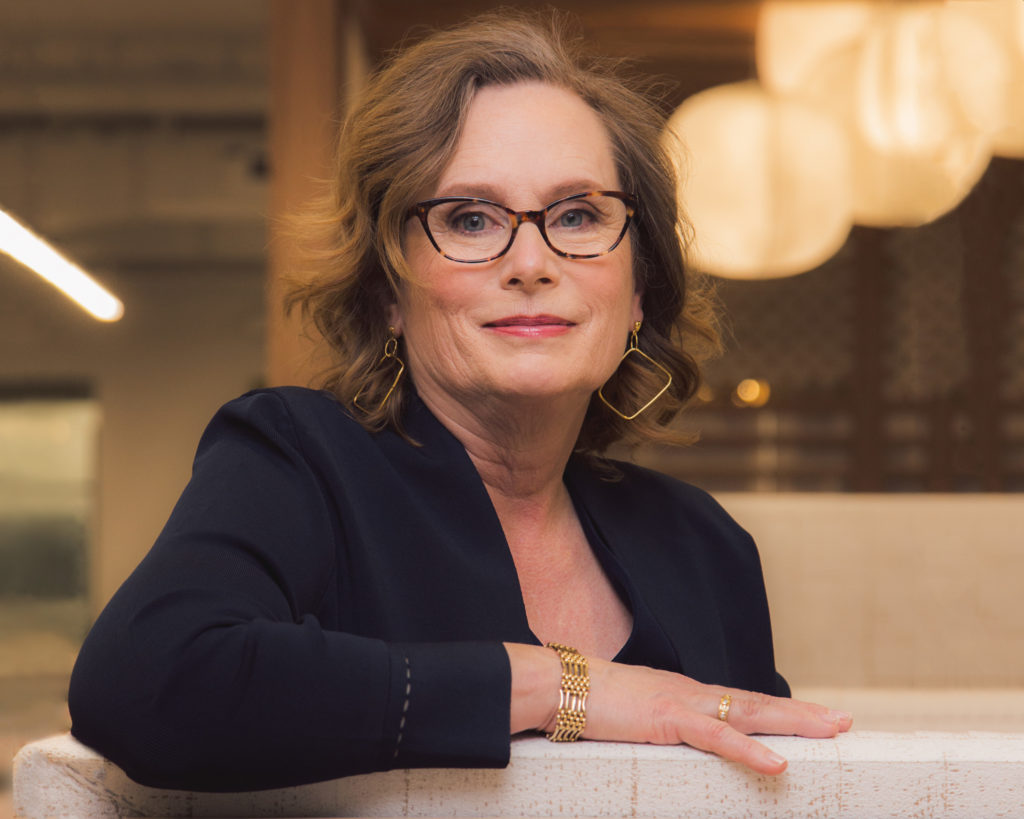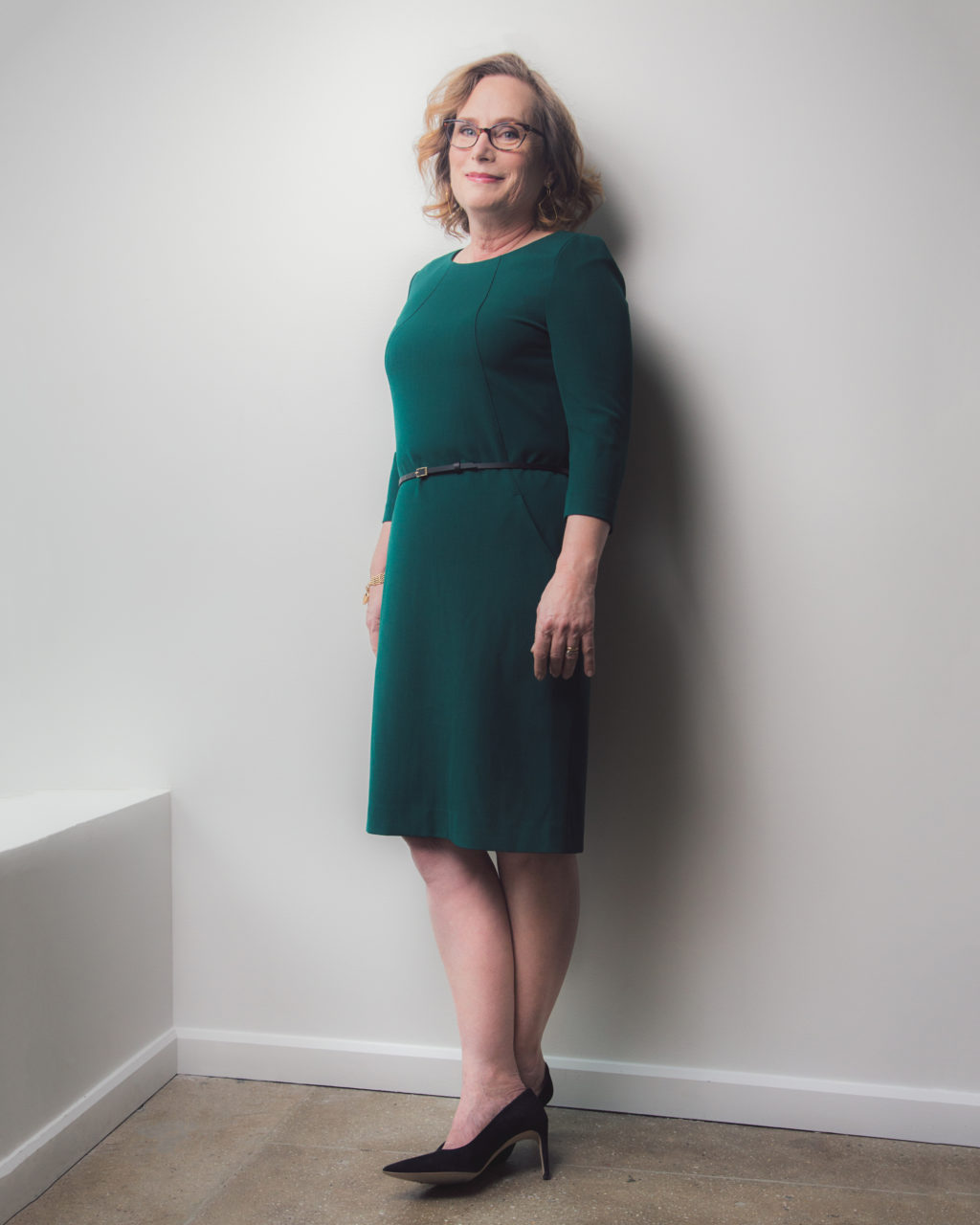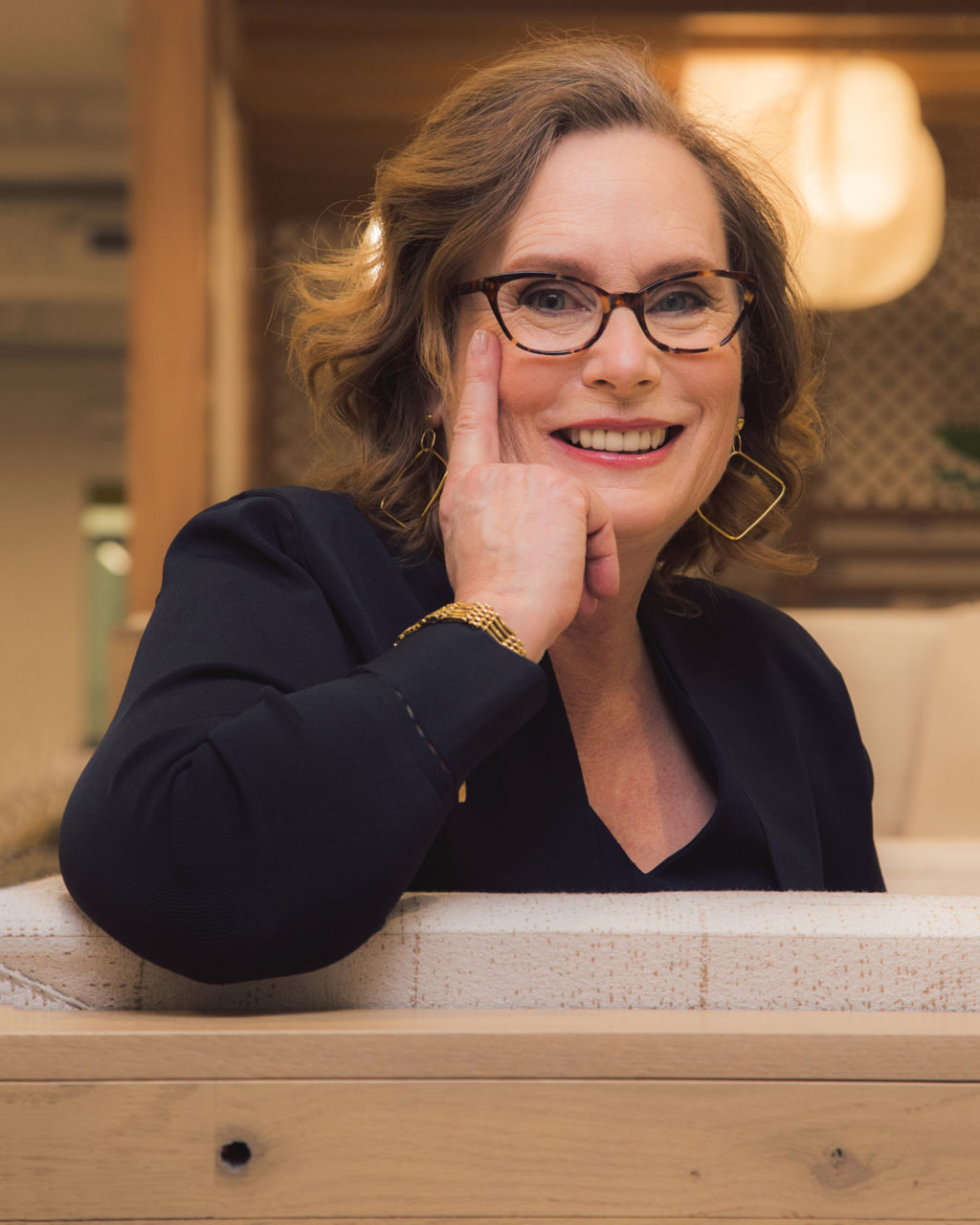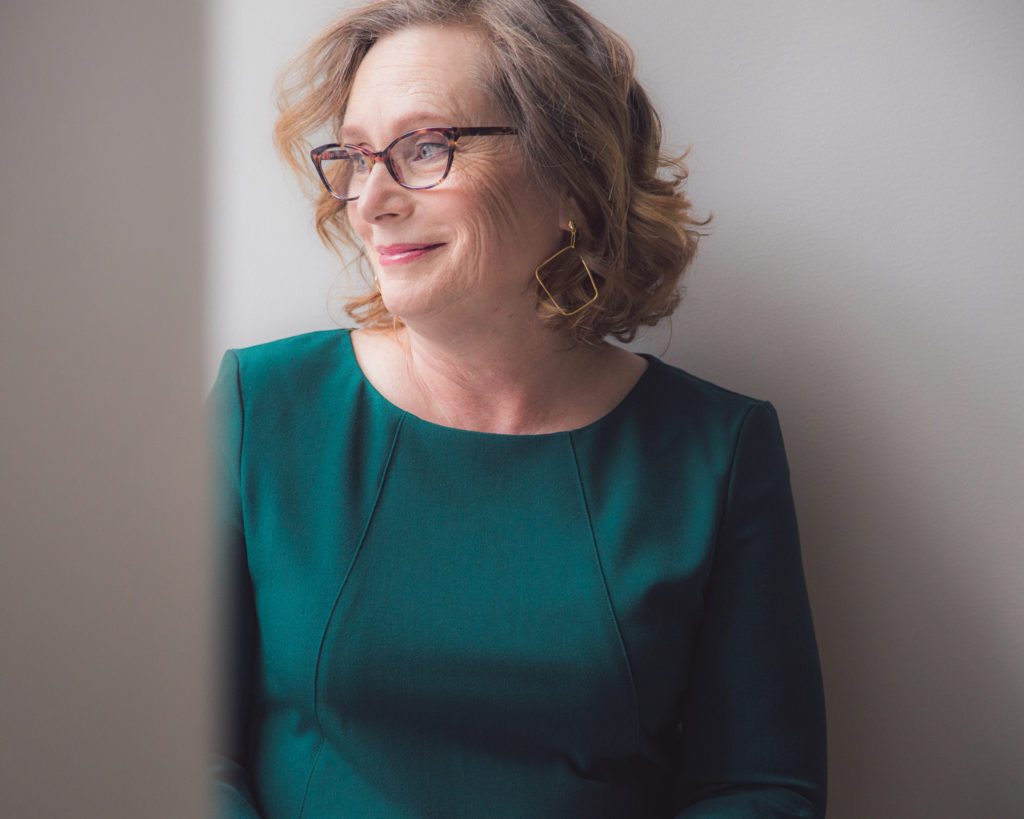Lawyer Maria Woltjen: “My Work Does Make Me Angry, but That Fuels Me”
April 04, 2018 | Filed in: Woman of the Week
Lawyer Maria Woltjen is the director of the Young Center for Immigrant Children’s Rights at the University of Chicago Law School, which recruits and trains child advocates for children going through deportation proceedings. She single-handedly piloted the program in 2004, and ran it on her own for three years; now, the organization has eight offices across the country. She is also an avid knitter, Great British Baking Show enthusiast, and winner of the 2017 UNICEF Chicago Humanitarian Award. Here, she talks about her “quite balanced” life, taking time off work to be a mom, and why it’s okay that her work makes her angry.
I NEVER ENVISIONED RUNNING AN ORGANIZATION of 40 people. When I first started this work, it was just me—I was the one who traveled down to the border to train child advocates, and the one who went to court. I was in the children’s shelters all the time, in the trenches, and I loved it. I do miss that aspect of the job. Last spring, I spent a day in immigration court with our team of attorneys in Houston, and I watched the judge spend half an hour explaining to the kids what it meant to be in immigration removal proceedings. He’s a good judge, and he cares about the kids, but the children were just wide-eyed and terrified and couldn’t understand what he was saying. Then a 17-year-old girl came in and told the judge that her school wouldn’t allow her to attend unless she had a letter from him. We were able to explain her rights to her, and that she didn’t actually need a letter from the judge to go to school. That direct contact with the kids was a big reminder of why we do what we do.
I WAS BORN ON A FARM IN MISSOURI. My parents were part of the Catholic Worker Movement, which focused on social justice issues, and the farm was intended to be a place to take care of recovering alcoholics. It was sort of House on the Prairie-ish. We had an outhouse and a pump in the kitchen and there was no hot water. My family was big—there were nine kids—and somewhat nomadic. After the farm, we lived in St. Louis, San Diego, San Francisco, and then Chicago, where my dad worked for an organization that fought against housing discrimination. He would organize these tests where a white couple would walk into a real estate agency and get 20 listings, and then a black couple would go in and the agency would say, “Sorry, we don’t have anything,” and then my dad’s organization would file suit against the realtor. So I was raised on these stories about injustice.

Maria wears the Sant Ambroeus jardigan in black, the Rachel dress in black, and the Rhea earrings.
ONE OF MY STRONGEST CHILDHOOD MEMORIES was when Martin Luther King Jr. came to Chicago. I went to the march with my dad and Ralph Abernathy, the influential civil rights activist, and I was walking between them and holding their hands. Then I saw my best friend’s father standing on the side of the street yelling at the marchers and swearing and shaking his fist. I hid from him because I knew if he saw me, I would never get to play with his daughter again.
I FINISHED HIGH SCHOOL EARLY, at 16. I started college and then realized after a year that I was really too young to be there. So I decided to travel. My plan was to spend three months in Israel, then spend some time in Europe and come back to school—six months off in total. I chose Israel because our neighborhood in Chicago was all Jewish at the time, and most of my friends were Jewish. So I got a one-way ticket and flew there with $50 and lived on a kibbutz. I ended up staying for two and a half years. Then I met a man who was South African, so I went to South Africa and lived there for another two and a half years. A lot was happening in both places. I was in Israel during the Yom Kippur War in 1973, and in South Africa during the Soweto riots. It was the height of apartheid, which was really shocking to see, especially coming from my background. There were separate buses, separate bus stops, separate restrooms. I was young, and I worked mostly as a waitress. I remember working in a restaurant and the immigration authorities came in. Those of us who didn’t have work papers sat down at a table and pretended we were customers, ordering food while the authorities checked everyone else’s credentials.
MY FAMILY LIFE HAD ALWAYS BEEN A BIT CHAOTIC, and I think that traveling was my way of breaking free of that life. After five years abroad, I came back to Chicago and finished undergrad and then decided to go to law school. After I graduated, I had a lot of student debt, so I worked at a law firm for four years, in litigation. My father was so disappointed that I went to work at a big law firm. He couldn’t believe that his daughter would go and get a law degree and then not go directly into public interest work.
AT THE LAW FIRM, I DID A LOT OF PRO BONO CASES, including a class action with the ACLU about inequality in women’s prisons versus men’s. In one year, I racked up about 450 pro bono hours, and then the law firm changed its policy and said we had to put more hours into the paying cases. So I started looking for a new job.

Maria wears the Etsuko dress in viridian, the Rhea earrings, and the Vanessa pump in black.
MY NEXT JOB WAS HEADING UP THE CHILDREN’S RIGHTS PROJECT for the Chicago Lawyer’s Committee for Civil Rights, and that’s what got me started with cases involving children. We did a lot of work on lead poisoning in public housing, as well as inequities in juvenile courts. There were laws in Chicago that if kids were charged with certain crimes, they would be tried as adults instead of juveniles. For instance, if you were charged with a drug offense within 1,000 feet of public housing, you were automatically transferred to adult court. It was only African American people living in public housing, and so it was only African American children who were charged under the law and tried as adults. We challenged that law, and I loved that work.
WHEN MY HUSBAND AND I ADOPTED OUR KIDS, our daughter Mattie, who’s from China, turned out to be hearing impaired. It was really hard to be a litigator and work full-time with a child with disabilities, so I left that job and stopped working full time. I did a lot of consulting, and stayed involved in children’s rights issues, but I was mostly home.
I WAS DEFINITELY AFRAID OF TAKING TIME OFF WORK TO BE A MOM. I was scared that if I stepped out, I wouldn’t get back in. I wanted to do it, but it was difficult, because so much of my identity was tied up in my work. I remember going to a dinner party once with four other couples, and one of the other guests was a stay-at-home mother. As other people realized she didn’t work outside the home, they completely ignored her the whole evening—no one was interested in speaking with her. I found it shocking.
AFTER TWO YEARS AT HOME WITH THE KIDS, I decided to go back to work, but I started fairly slowly. I took a position at the Loyola Child Law Center, where I could work four days a week and leave the office at 4:00 p.m. Still, the pace felt so fast at first. I remember going back downtown and it seemed like people were speeding down the sidewalk, practically running.

Maria wears the Sant Ambroeus jardigan in black, the Rachel dress in black, and the Rhea earrings.
IN 2004, I WAS ASKED TO DEVELOP A PROGRAM TO PROVIDE ADVOCATES for unaccompanied immigrant kids. These are kids who come from all over the world on their own, arrive at the border or at an airport, and are apprehended by the government. I was brought in to do this work because I had a background in children’s rights, but I had absolutely no immigration background. I was totally shocked that kids were appearing in court without parents or guardians or advocates, and treated the same way as adults. It was a huge challenge and it reminded me of the urgency of this work.
SLOWLY BUT SURELY, WE STARTED TO GROW. I had no idea that the program would get to 40 people. We had $60,000 in seed funding, and that was it. But the numbers of child immigrants started growing in 2012, and by 2014, 68,000 children arrived at the border, compared to about 8,000 a year when I started this work. In the years since, we’ve opened offices in Houston, New York, Washington, D.C., Los Angeles, Phoenix, and San Antonio. That was on top of our existing office in Chicago and our border office in Harlingen, Texas.
IT’S DAUNTING WHAT WE’RE UP AGAINST NOW. Oftentimes I don’t feel totally prepared, but I charge forward like I know what I’m doing. It’s similar to when I first started; everyone assumed I had official capacity, and as long as I acted like I did, people went along with it. It helps that I’m surrounded by very strong colleagues who are not afraid to challenge me.

Maria wears the Etsuko dress in viridian and the Rhea earrings.
IN A FUNNY WAY, MY LIFE IS QUITE BALANCED. If it weren’t for my work, I would have gotten completely absorbed by my two children’s lives, especially my daughter’s because she has special needs. On the other hand, if I didn’t have my children, I think my work would completely take over. Still, it’s an ongoing struggle. I wish I didn’t have email on my cell phone. It’s important to take time to cut myself off, but I’m not the best at it.
THIS WORK DOES MAKE ME SO, SO ANGRY SOMETIMES, but that also fuels me. We have cases now where young kids have been separated from their parents for four to six months, or where the mother gets deported and the child is still here. It does get to me—how could it not? Many of our staff are immigrants or have family members who are immigrants. This is personal, and these are tough times for people.
TO UNPLUG, I COOK. I put my phone away and make a great meal or go out to dinner with friends. I also knit, even though I’m not very good at it and my projects take multiple years. On normal weekends at home, I’ll put on The Great British Baking Show and knit. I don’t make anything very extravagant—I’m making a wrap right now—but I buy really nice yarn because I get a lot of pleasure out of how it feels.
I THINK A LOT OF MY WORK ETHIC comes from being raised in a home where my parents really believed that opportunities ought to be fairly given. It’s not fair for the kids who end up in deportation proceedings in a system designed for adults. Being able to change the system and work to change the laws has been so rewarding. When I started, immigration judges didn’t know who we were; now, those judges proactively ask that a child advocate be appointed on a case. Still, there’s no shortage of things to be done.
Photographs by Andrew Segreti.





